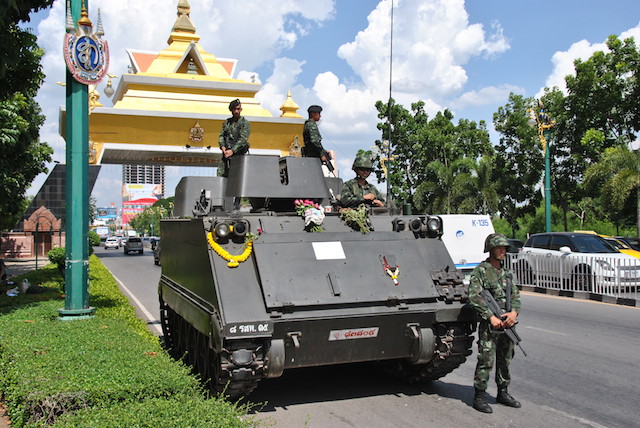KHON KAEN – Since the May 22 coup d’état, Thailand’s military has tried to sweep the country clean of weapons to quell fears of a violent uprising. But in Isaan, the heartland of the Red Shirts, some of the soldiers’ actions have raised doubts about the military’s intentions. Red Shirts here believe that the military may be wrongly framing peaceful Red Shirts as violent terrorists in a high-profile legal case, which could set the stage for a wider crackdown on Red Shirts in the region.
On May 23, soldiers raided an apartment building in Khon Kaen city and arrested around twenty people allegedly involved in a terrorist plot. The military claims the plot, known as the ‘Khon Kaen Model,’ was designed to incite violence in Khon Kaen. In the following days, they arrested additional suspects in their homes, bringing the total number of the accused to twenty-four.
Soldiers reported that they seized grenades, ammunition, and gas tanks at the site of the apartment building. After interrogating the suspects, the military announced what they found to be the Khon Kaen Model’s master plan: mobilize anti-coup supporters, disarm authorities, force financial institutions to give money to the poor, and declare a nationwide “zero debt” policy.
It’s the kind of story that plays right into the conservatives’ two biggest fears: militant Red Shirts and Thaksin’s populism.
The Khon Kaen Model case preceded the military’s nationwide call to civilians to dispose of all firearms. On June 3, the military ordered that all handguns, legal or illegal, be surrendered or thrown away within a week, or else gun owners risked facing up to 20 years behind bars. According to one 2011 report, there are an estimated ten million civilian firearms in the country, which lands Thailand in tenth place worldwide for the most guns in civilian possession.
Red Shirts and those close to the accused in the Khon Kaen Model case insist it is not a clandestine plan of a militant revolt, as the military claims, but part of a broader campaign for social justice and equality. A relative of one of the arrested explained that the group only gathered that day to discuss Red Shirts’ peaceful responses to the coup.
She and many others interviewed by The Isaan Record asked to remain anonymous for fear of retribution.
A staff member of the apartment building, who saw the arrests take place, also said the group seemed to be meeting peaceably. “In the media, the reports were overblown. What happened from what I saw was they didn’t rent a whole floor, they weren’t staying two months, they just stayed one day, and weren’t even sleeping there. There was never any plan to stay for a long time.” The staff member never saw any weapons enter or leave the apartment building.
A relative of another of the accused described how more than a dozen soldiers arrived at her house in a village outside of the city a few days after the arrest. The soldiers did not produce a warrant, but they searched her entire house. They left without finding any weapons but confiscated only a red hat and a United Front for Democracy Against Dictatorship (UDD) form, she claimed.
Relatives and villagers close to the defendants told Benjarat Meethien, the lawyer of the accused, that soldiers have been searching the homes of at least some of the men awaiting trial. The wives feel threatened by these unexpected visits, and they think their husbands are innocent. “The villagers told me that when soldiers armed with guns enter the villages unannounced, it terrifies them,” said Ms. Benjarat.
Beyond the families of the accused, other Red Shirts around Khon Kaen wonder about the implications of this case. “The news accounts of the ‘Khon Kaen Model’ have gone overboard,” said one Red Shirt organizer, who knows a handful of the men involved in the case. “But the military has never been on our side.” He fears that cases like this one could give credence to more arrests of Red Shirts in the region, even though the majority of Red supporters are nonviolent.
Still, a number of small Red Shirt groups that organize “defensive trainings” have cropped up over the years, which the military could perceive as a threat to their rule. One source explained her anger over the arrests on May 23, but she also described her involvement in an underground defense training that taught her and a hundred others how to use BB guns, in case of attack.
The defendants’ lawyer expects the trial to take place at the end of June. At the time of writing, none of the accused had been released on bail. In the military court system, there are no appeals.




